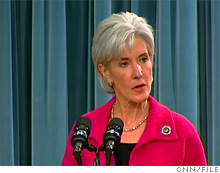Paying for health care: Wealth tax is 'legitimate'
Health and Human Services Secretary Kathleen Sebelius said Sunday that higher taxes was one possibility for paying for an expansion of coverage.
 |
| Health and Human Services Secretary Kathleen Sebelius |
WASHINGTON (CNN) -- More work is needed on proposed health care reform legislation to ensure that whatever bill eventually gets passed by Congress is budget neutral, Health and Human Services Secretary Kathleen Sebelius said Sunday.
Appearing on the NBC program "Meet the Press," Sebelius said an additional tax on wealthy Americans is "a legitimate way to go forward."
She noted the tax surcharge provision in a House proposal was one of several options under discussion to help pay for overhauling the nation's ailing health system.
A final bill "will be paid for -- it will not add to the deficit," Sebelius said of health care reform, which is currently President Barack Obama's top domestic priority.
Obama seeks an overhaul to ensure that health insurance is available to the 46 million Americans currently uninsured while preventing costs to both the government and individuals from continuing to climb.
The House and Senate are working on Democratic proposals that would create a government-funded public health insurance option intended to drive down costs of private coverage.
However, the non-partisan Congressional Budget Office reported last week that the measures currently under consideration in both chambers would fail to pay for themselves, increasing the budget deficit.
Republican opponents seized on the CBO report as ammunition against Obama's push to have a bill from each chamber approved by the time Congress begins recess on Aug. 7.
Senate Minority Leader Mitch McConnell of Kentucky, also appearing on "Meet the Press," said the government is over-reaching by seeking to reform the whole system.
He called for expanding the tax deduction on health care costs for employers to include individual taxpayers -- what the Republicans call equalized tax treatment -- and limiting medical malpractice lawsuits that he said drive up the cost of medical care.
"I'm not in favor of doing nothing," McConnell said. "It's important to reduce the number of uninsured. The question is how to do that."
However, White House Budget Director Peter Orszag said the real purpose of Republican criticism is to slow momentum in hopes of eventually killing health care reform.
"The typical Washington bureaucratic game of 'if you don't have a better alternative, just delay in the hope that that kills something' is partly what is playing out here," Orszag said on the CNN program "State of the Union."
Democrats pushing the health care bills argue the CBO analysis does not take into account the financial impact of cost-cutting measures under discussion, nor how stronger preventive care programs will reduce demand and costs.
Sebelius noted that all proposals include various provisions to decrease fraud and improve efficiency of the current system.
"In all the plans, more than half the money to pay for the proposal is already in the system," Sebelius said, referring to what she called "misdirected" money for ineffective programs and other instances of waste and inefficiency.
Orszag also called for creating an independent commission of doctors that would set reimbursement levels and other health care policy issues under congressional oversight, calling it "the single most important thing that's missing from the legislation at this point."
However, Sen. Orrin Hatch, R-Utah, told the CBS program "Face the Nation" that such a panel would end up limiting care available to people, like in the government-run system of England. He said he would propose a plan next week modeled on the 1997 Children's Health Insurance Program he sponsored with Democratic Sen. Ten Kennedy of Massachusetts to provide states with money to set up programs based on need.
Both the House and Senate proposals so far include mechanisms to raise revenue through increased or new taxes.
The Senate Finance Committee wants to create a new tax on medical benefits provided by employers, a plan that Obama opposes.
Sebelius said the new tax could cause employers who provide coverage for 180 million Americans to change or drop their programs, which could "dismantle the private market."
"He's reluctant to move in that direction," she said of the president.
Obama continues to favor reducing the limit on income tax exemptions for high-income Americans, Sebelius said.
Both Sebelius and Orszag emphasized that the progress was occurring in Congress, and that Obama's goal of legislation coming from both chambers by Aug. 7 remained possible.
"This hasn't happened in 50 years for a reason -- it's complicated," Orszag said. "(The) legislative process is working. I think people are sort of reaching judgment about who's going to win the marathon based on who's ahead at, like, mile 19." ![]()

